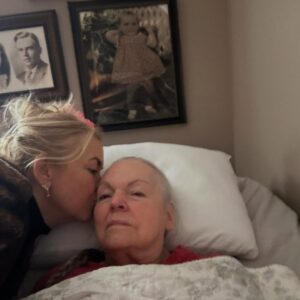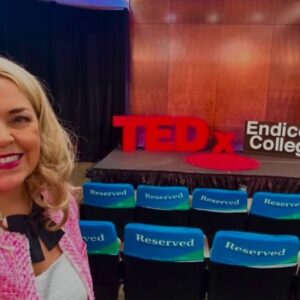It seems the very foundations of our world are shaking right now, between the pandemic and the protesting, so it seemed appropriate to talk about one of the foundations of our human bodies: teeth.
I had dinner with my friend, Shannon, a few days ago overlooking the harbor. We were sitting at the counter drinking wine, when there was a knock on the door. In walked a woman with blue hair and sleepy eyes and a massive tattoo of an Indian elephant that spread across her entire back. She said she worked in a dental office, and Shannon started talking about her recent four root canals.
I said, “Wow. Four? One is intense, but four? That’s hard core.”
Shannon nodded. “Oh I cried.”
I nodded. “No one ever talks about the emotional side of teeth. When I create curriculum for children, I always tell parents and teachers that more than age, look for physical milestones, like the losing of teeth. When people tell me their children are especially sensitive, weepy, or needing extra attention, I ask them if they have a loose tooth. They almost always do. I mean if you think about it, your teeth are a fairly permanent fixture in our bodies. They are one of the last parts of the human body to decay. They are so unique to every human they even use them to identify remains.”
She stared at me for moment before saying, “I’m so glad you said that! I am usually such a badass but I was blubbering like a huge baby in the dental chair. I told the dentist, while I was sobbing, ‘I’m not usually like this.’ You should write about that in your blog.”
I laughed. “I have already written about teeth but I haven’t posted it yet. Weirdly, I get a lot of texts about teeth. Losing teeth, growing teeth, wisdom teeth, pulling teeth, all of it has more of an effect on both children and adults than people realize. It’s strange because no one really talks about it. I don’t know if it’s because it makes humans feel vulnerable, but most people I know have a visceral reaction when it comes to teeth and dental work. I mean, think about the term ‘root canal’. You are literally digging into the roots of the hardest substance on the human body. Intense.”
A while back, my niece texted:
“So my son was at school and he broke down sobbing…. What’s going on?”
I texted back: “Does he have a loose tooth?”
“I don’t know. I’ll check when he gets home.”
The next day I got a text that her son was biting down on a sandwich and his tooth popped out. She said, “How do you know these things?”
I laughed and said I had learned all sorts of things over thirty years of working with children, being a teacher and a Mom.
Then I got a text asking me for my “sources”, because her husband didn’t believe a loose tooth would cause emotional fragility. Hahaha.
I understand because I didn’t believe it at first either. I had worked with children for years when I decided to get my Masters in Education. I chose Harvard because it had an accelerated program and I could get my Masters in one year. Ironically, I ended up loving the reading, writing, researching, and analyzing so much I never wanted to leave. I took many courses in human development and psychology, and while reading the work of renowned child psychologist Erik Erikson and his in-depth theories on the “losing of the teeth.” Around the ages of 5-8, children start losing their teeth and their permanent teeth grow in. Now scientifically, baby teeth, or milk teeth, are directly created by the parents, but permanent teeth are created by the child. All child psychologists agree that there is a big developmental milestone passed around the ages of 7/8, right along with the growth of the child’s own teeth and losing of their baby teeth. Piaget called it “Concrete Operational”, meaning the child has more of a sense of time, grows more independent, and starts to differentiate herself from the adults around her. Mormons baptize their children at the age of eight, because founder Joseph Smith said it was the age when children started to understand right from wrong. Now, I know a lot of 8-year-olds, and I would not put them in a judge’s chair to weigh in on right and wrong, but Joseph Smith was talking about the developmental leap that takes place at this age.
Waldorf Education Methodology takes it even further, believing that children are only ready to start to read and write once they have lost their teeth. In Waldorf, losing teeth is a signal that the child is becoming independent.
Physical development is intricately tied to emotional and cognitive development. A child just learning to walk has very different emotional/cognitive capabilities than a child who can balance on one foot for several seconds. While teaching, I’ve seen large children who are very independent and capable and joyful at the beginning of the year, all of sudden start sucking their thumb and carrying their blanket around with them mid-year. As a teacher, I talk to the parents to make sure there isn’t anything happening at home that I could help support. Most often, in my experience this type of behavior happens right before a big developmental leap, which I tell parents so they are reassured. It’s kind of crazy that every single time, the child would lose their tooth, and the weepiness and blanket-holding would disappear and suddenly they are doing things they couldn’t do before.
If you really think about it, we make a lot of judgments about people based on their teeth. If someone has straight white healthy-looking teeth, we think of them as beautiful, clean and cared-for. Whereas crooked black teeth elicit a different negative response, signifying decay and disease. In films, if they want to make a villain look scary, they will give them sharp teeth, pointed teeth, crooked teeth or big metal gadgets in their mouth. In our present-day culture, some people have diamonds implanted into their teeth to make them even more sparkly, or wear “grills” as dental jewelry.
And what about wisdom teeth? I like to geek out over etymology, so I was thrilled to learn that Aristotle wrote about Wisdom Teeth more than two thousand years ago. He called them “dens sapientiae”, which directly translates to “wisdom teeth” because they appear later in life, usually in late teen years when people are no longer children, although I personally would not call the teen years “wisdom years”, but two thousand years ago, teens were practically middle aged because life spans were so much shorter.
Thank goodness for the tooth fairy, transforming a painful, scary event into something exciting and magical. When children lose a tooth at my kid’s school, they get a big tooth necklace from the nurse. They put it on and wear it all day. It’s hollow and securely holds their tooth so they can put it under their pillow at night. It also is a way to mark an important event, and when teachers and friends see a child wearing a tooth necklace, they often talk to the child, hugging them for comfort or cheering for this exciting event, the most exciting part being the tooth fairy visit later that night. When my daughter lost a tooth, it was a high profile affair with lot’s of tooth wriggling and tears and blood. My son, on the other hand, won’t even mention his loose tooth. He will just casually pull it out at dinner one night and hand it to me saying, “I lost my tooth,” as he walks by. We have a really fun tooth fairy who sometimes leaves cash, and sometimes leaves tiny shoes, and always leaves a trail of glitter.
My daughter lost her last baby tooth a few years back. It was midnight, and she was taking forever to go sleep. I couldn’t stay awake any longer, so I went up to her room and climbed into her bed to hug her and maybe to leave her a little something under her pillow. I slid my arm quietly under her pillow, hoping she would just think I was snuggling her. When I stood up to leave the room, she turned on her lamp and said, “What are you doing?”
Panicked, I said, “Just snuggling you.” As I talked, I reached into the pocket of my robe and found a mini box of Junior Mints. I pulled them out, “I was just… getting the Junior Mints I left in here.”
There were so many confusing things about this entire exchange. One, I don’t eat Junior Mints. (I don’t know why they were in my pocket.) Two, when I go up to say goodnight to my daughter, I gently kiss her forehead, I never ever crawl into her bed to snuggle. She is like a cat, always has been, and she only likes to hug and snuggle on her own terms.
I was caught. The next morning she announced to me and her little brother that I was the worst Tooth Fairy ever. I disagree! I pride myself on my fairy magic. We laughed so hard, and I sprinkled a handful of fairy dust on both of them before they left for school so they could remember they are magic.
So, at the end of my dinner with Shannon and the blue-haired dental office worker, Shannon told me she keeps jars of her baby teeth in her house, along with her dead pet cat. I said, “You have your baby teeth and your dead pet in jars around your house?” She nodded and took a bite of her tomatoes.
Hmmmm. I wasn’t sure what to say about that. I can’t picture it. I don’t even know what that means. People never cease to shock the hell out of me. I do have friends who live in a castle, who mounted the head of their favorite pet goat, Sammy, on their wall. They decorate Sammy with hats and sunglasses, and I can’t argue with the fact they are keeping his memory alive. They also have a pet bat named Sunshine who sleeps in a top hat. That means his bed is a top hat, not that he wears one to bed, although I do love that image of a sleeping bat wearing a top hat. When their pet monkey, Gracie, died, they buried her and dug up her bones a few months later. The dad carries Gracie’s bones around with him in a pouch he wears around his waist. I guess that’s no stranger than the daughter, who I greeted one day while she carried a Japanese chicken around on a giant wooden spoon. And speaking of shaking foundations, they had to completely renovate their castle after the Northridge earthquake because it shook them so hard.
I have loved marching in the protests happening around the world right now, but it definitely feels like the world’s foundation is shaking. And my own little world is shaking. Because of the divorce, I will have to sell our house soon, another big change for the me and the kids. And I have to find a way to support my children financially after being a stay-at-home mom for 16 years. And now that my father and best friend are gone, I no longer have their guidance and wisdom and support. I have to find it somewhere else: in the sea and the stars, in my sisters and pets, in the lush blooming flowers everywhere right now. No wonder it feels like my teeth are rattling! And my kids need their mom as much as they ever did, yelling at me for emergency hugs and looking to me for support. (Oh and a little thing called supervision. You can’t leave teens unsupervised for long!) I moved a lot as a child, and my Dad said he thought it was good for us because our center was never a home, but our family of eight. I have always loved moving because I love change. Not painful change, but I love new adventures and meeting new people and experiencing new things. That’s why I love to travel.
So there you go, shaking foundations and root canals and monkeys and chickens and fairies… I guess we all have our own individual ways of coping with change and loss and shaking foundations. My particular way involves wings and flowers and a little fairy dust…














